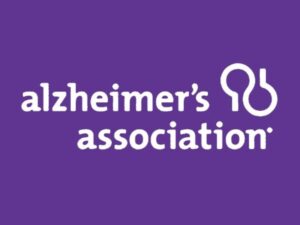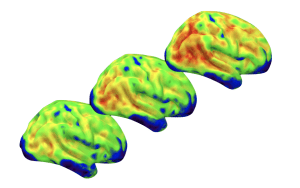Lab Funding
Alzheimer’s Association Grant
2024 Supporting Research in Health Disparities, Policy and Ethics in Alzheimer’s Disease and Dementia Research (HPE-ADRD)

Alzheimer’s disease (AD) poses a higher risk for Latinos, who are 1.5 times more likely to develop AD than non-Latino Whites. Even though Latinos are a racially and geographically diverse group connected by cultural and linguistic heritage, they differ from non-Latino Whites on several characteristics of AD, such as a younger age of symptom onset and lower genetic risk associated with APOE4 allele. Social and structural determinants of health along with discrimination and language barriers contribute to health disparities and hinder diagnosis and care among Latinos. This hampers our understanding of AD and the development of treatments and diagnosis of AD. Thus, cross-cultural investigations of aging are necessary to understand how ethnic and genetic factors impact memory, the brain, and risk of AD. When measuring age-related cognitive impairment, we must be mindful that traditional measures of memory may not be comparable across ethnic groups. Further, some measures of memory have been shown to be more sensitive to age-related memory impairment (e.g., mnemonic discrimination tasks) compared to traditional memory tasks or standardized neuropsychological batteries. This project aims to investigate how ethnic and genetic risk factors of AD impact memory in cognitively normal older adults and to develop precise neurobiological profiles associated with memory and AD risk. To accomplish this goal, we have developed a culturally inclusive memory task to examine cognition with a diverse sample in mind, which is an innovative endeavor, as most existing memory tasks include Americanized stimuli. When paired with multimodal imaging techniques, we have the capability to make novel strides towards understanding ethnic and genetic risk of AD in Latinos.
Even though the incidence of AD is greater in Latino populations, previous neuroimaging studies in aging and AD primarily enroll highly educated, non-Latino White participants. Therefore, more research is required to understand how sociocultural influences drive differences in AD characterization, risk factors, diagnosis, and care. This study will provide a better understanding of sociocultural, genetic, and cognitive determinants of memory and brain function that contribute to inequities and disparities in risk of AD across Latino and non-Latino populations. The proposed project seeks to ameliorate existing gaps in health equity by diversifying research recruitment to directly examine the risk of AD in this population. Furthermore, this project will reduce systemic language and cultural barriers to research participation by using community-based participatory research, where 1) members of the research team are part of the community being investigated and 2) we will form an advisory board with members from the community to help guide our research questions and approaches, which will inform the development, translation, and validation of recruitment materials, cognitive tasks, and questionnaires. By building a culturally informed and diverse research group that reflects the population served, this project aims to overcome recruitment barriers that have led to underrepresentation of Latino populations in AD and aging studies. Importantly, through the development and implementation of a culturally inclusive memory task, we will probe memory and neuroimaging biomarkers that are sensitive to age-related cognitive deficits, increasing the generalizability of our findings. All behavioral and neuroimaging datasets, will be made publicly available so that additional research can be produced from our work.
Alzheimer’s Disease Research Grant (BrightFocus Foundation)
Precise neurobiological profiling of the locus coeruleus and medial temporal lobe for the early detection of Alzheimer’s disease

The cause of Alzheimer’s disease (AD) is unknown. We have begun to understand which brain regions are impacted decades before clinical symptom onset. However, current research has not utilized tasks sensitive enough to detect the earliest changes in memory that could predict AD. In this project, we will use sensitive memory tasks that target the earliest brain regions impacted in AD. Paired with state-of-the-art brain imaging techniques, we will identify early cognitive and brain changes in AD before clinical symptoms manifest, which could aid in earlier interventions to prevent or slow AD.
![]()
This project is funded by the BrightFocus Foundation.
NARSAD Brain & Behavior Foundation Young Investigator Grant
The impact of antidepressants on emotional pattern separation and medial temporal lobe dynamics

This project is a novel investigation of the mechanisms underlying antidepressant action on emotional memory and medial temporal lobe dynamics in depression. Currently, we do not understand the cognitive and neural mechanisms underlying depression. Cross-species research suggests hippocampal pattern separation may be a potential mechanism underlying memory dysfunction in depression, which involves processing overlapping experiences as distinct from one another. Pattern separation may provide a mechanism of action for antidepressants, the first-line treatment for depression, due to their impact on hippocampal neurogenesis and pattern separation in rodents. However, little work has been done to examine these processes in humans. Furthermore, antidepressants are only effective in about 20% of those receiving treatment, thus, an examination of antidepressant responders and non-responders is essential in understanding antidepressant mechanisms. Our laboratory has developed an emotional mnemonic discrimination task designed to tax hippocampal pattern separation. When paired with high-resolution MRI, we can probe this system at an unprecedented level of detail. The current proposal aims to uncover the impact of antidepressants on emotional memory and amygdala-hippocampal dynamics in depression. Great advances will be made towards understanding antidepressant mechanism of action and impacts on the negativity bias in depression. This is a novel and innovative approach, which could lead to more targeted interventions toward emotional biases and their underlying neural mechanisms in depression.

This project is funded by the Brain & Behavior Research Foundation.
Undergraduate Funding Opportunities
- Amount: $500 – $5,000
- Purpose: Designed to assist students of Hispanic descent obtain a college degree
Graduate Funding Opportunities
- Amount: $20,000
- Purpose: Living expenses for women completing their dissertation
- Amount: $28,000
- Purpose: One year of support for students working on their dissertation; intended to support the final year
Health Policy Research Fellows
- Amount: Varies
- Purpose: A leadership development opportunity for second-year full-time doctoral students from underrepresented populations and/or disadvantaged backgrounds—students whose ethnicity, socioeconomic status, ability, and other factors allow them to bring unique and diverse perspectives to their research. They want to apply their research to advance health and equity, and their innovation helps build a Culture of Health, one that enables everyone in America to live longer, healthier lives.
- Amount: $500 – $5,000
- Purpose: Designed to assist students of Hispanic descent obtain a graduate degree
Lodieska Stockbridge Vaughn Fellowship
- Amount: Typically around $16,000
- Purpose: Fellowship for a Rice graduate student with a record of outstanding achievement
Mellon/ACLS Dissertation Completion Fellowships
- Amount: $35,000
- Purpose: Supports a year of writing and research for PhD students in the last year of dissertation writing
NSF Graduate Research Fellowship Program
- Amount: 3 years of support
- Purpose: Provides support for those at the beginning of their graduate careers
P.E.O. International Peace Scholarship
- Amount: Up to $12,500
- Purpose: Provides funding for women from outside the US who will be pursuing graduate studies in the US
- Amount: Up to $20,000
- Purpose: Provides funding for women who demonstrate academic excellence and achievement in their doctoral program
Paul & Daisy Soros Fellowships for New Americans
- Amount: Each award is for up to $25,000 in stipend support, as well as 50 percent of required tuition and fees, up to $20,000 per year, for one to two years.
- Purpose: Supports new Americans, immigrants, or the children of immigrants who are pursuing graduate school in the US
Postdoctoral Research Funding Opportunities
AAUW Postdoctoral Research Leave Fellowship
- Amount: $30,000
- Purpose: To assist women in obtaining tenure and further promotions by enabling them to spend a year pursuing independent research.
Ford Foundation Postdoctoral Fellowship
- Amount: $50,000
- Purpose: Funding for a postdoc who plans to pursue a career in teaching and research at the university level
L’Oreal USA Fellowships for Women in Science
- Amount: $60,000
- Purpose: Awards women for their contributions to STEM and commitment to serving as role models for younger generations.
- Amount: $1,000,000
- Purpose: This annual award recognizes an outstanding young researcher in any field of science or engineering supported by the National Science Foundation.
NSF SBE Postdoctoral Research Fellowships
- Amount: Varies
- Purpose: Encourages independence early in the Fellow’s career through supporting his or her research and training goals. The research and training plan of each Fellowship must address important scientific questions within the scope of the SBE Directorate and the specific guidelines in this solicitation.
Ruth L. Kirschstein Postdoctoral Individual National Research Service Award
- Amount: Varies
- Purpose: Enhance the research training of promising postdocs with promising careers in healthcare related research
